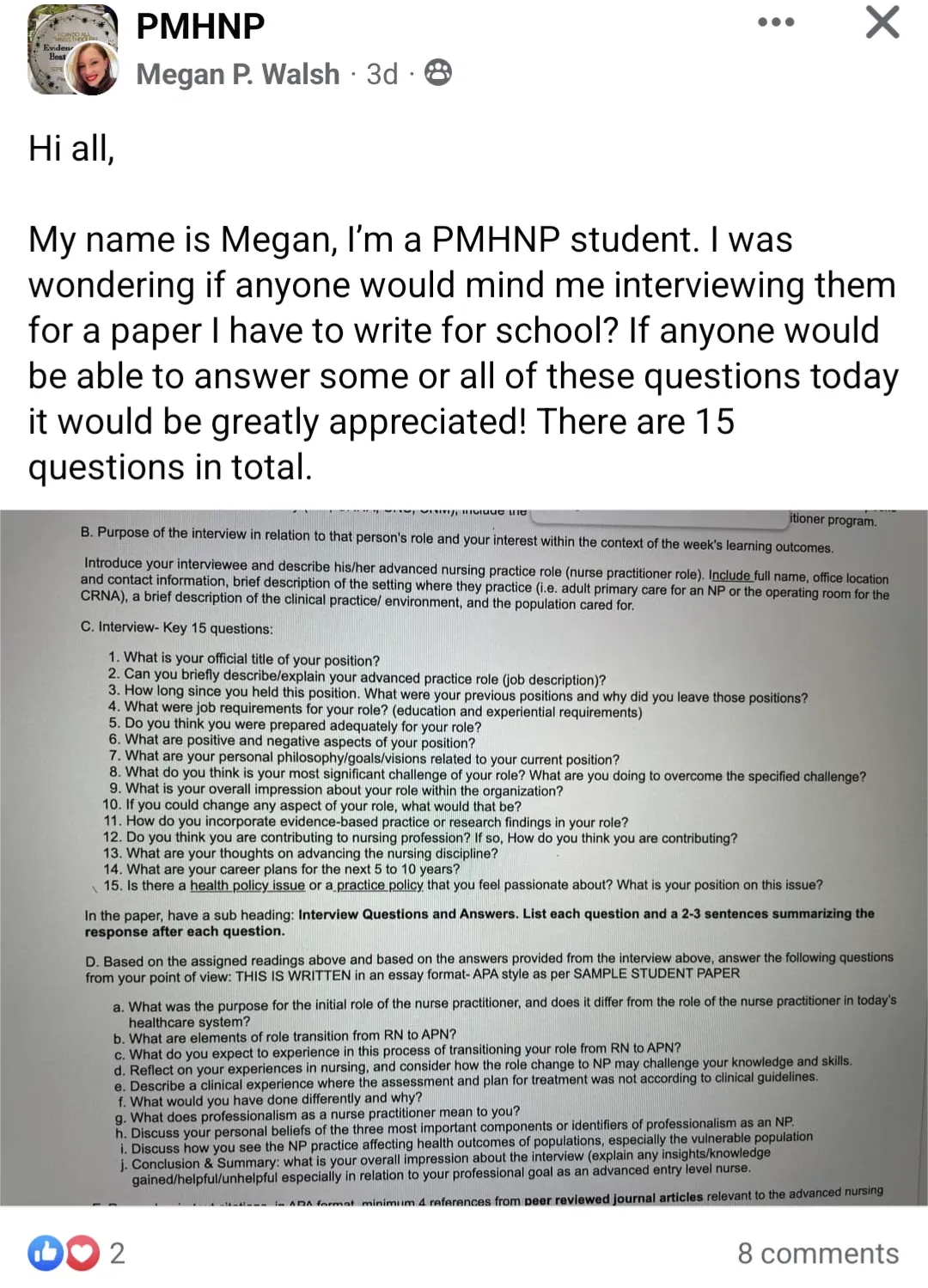Writing junk essays is an important part of NP education
💬 comments
That's why we did your homework for you.

Recently, we came across this post by PMHNP student Megan P. Walsh in the PMHNP Facebook group. It's not every day that we get a firsthand glimpse of the educational rigor of what counts as NP school these days.

You see, Megan has to interview a nurse practitioner, ask them 15 questions, and then write an essay in APA-style format answering 10 questions with 2-3 sentence responses. It's been quite a few years since we've graduated from high school and we were too busy learning actual fucking medicine in medical school to dick around by writing high-school level essays, so humor us as we do Megan's homework for her - from the perspective of a physician, of course!
a. What was the purpose for the initial role of the nurse practitioner, and does it differ from the role of the nurse practitioner in today's healthcare system?
The nurse practitioner was originally developed in the 1960s by pediatrician Henry K. Silver, MD and nurse Loretta Ford, EdD in the 1960s to address the "gap" in primary care for children. Unfortunately, today's nurse practitioner role has mutated into a grotesque caricature of its former self, as evidenced by the huge fucking number of NPs pretending to be medical doctors and poorly practicing medicine under the guise of "advanced practice nursing" without any physician supervision whatsoever.
b. What are elements of role transition from RN to APN?
Bold of you to assume there is a transition, especially with the proliferation of direct-entry NP programs that require no nursing experience whatsoever. Why transition from one diploma mill to another when you can stay at the same diploma mill?

c. What do you expect to experience in this process of transitioning your role from RN to APN?
We expect you'll lose a lot of respect from physicians and become the laughingstock of medicine because of how poorly trained you will be, especially when taking care of complex and vulnerable psychiatric patients. We expect you'll start patients on wildly inappropriate medication regimens that would make Mark H. Beers, MD roll over in his grave (despite the fact that he was a double leg amputee) and create messes for the actual physicians to clean up.
d. Reflect on your experiences in nursing, and consider how the role change to NP may challenge your knowledge and skills.
Again, bold of you to assume there was any experience in nursing to begin with! No need to challenge their knowledge and skills - in our experience the average NP is already mentally challenged anyway with a terminal case of Dunning–Kruger syndrome, being incapable of interpreting basic fucking laboratory studies such as a urinalysis or CBC.
e. Describe a clinical experience where the assessment and plan for treatment was not according to clinical guidelines.
How about that one time when an NP's gross malpractice and negligence killed a critically ill kid? Or that other time when an NP decided to consult Facebook on what to do about life-threatening hyperkalemia in a patient with a potassium level of almost 10?!
f. What would you have done differently and why?
I don't know, maybe fucking ask the supervising physician? Assuming there was a supervising physician to begin with, which is unfortunately not a legal requirement in 26 states and counting.
g. What does professionalism as a nurse practitioner mean to you?
Acknowledging the fact that physicians are the undisputed leader of the healthcare team. It also means humbly acknowledging the fact that you have less than 5% of the training of a physician, and that therefore, you require physician supervision at all times.

h. Discuss your personal beliefs the three most components or identifiers of professionalism as an NP.
Not making TikTok videos of one's scantily clad self, not pretending to be a doctor and falsely claiming to have a medical degree, and not consulting Facebook for medical questions about real, live patients.
i. Discuss how you see the NP practice affecting health outcomes of populations, especially the vulnerable population.
Almost universally, NPs negatively affect health outcomes of populations while driving up healthcare costs, especially when they decide to fill the primary care gap with Botox. In states where NPs have full practice authority/no legal requirement for physician supervision, the medically vulnerable will only become more vulnerable as those who are medically literate start demanding to see physicians only, resulting in the eventual development of a two-tiered healthcare system.
j. Conclusion & Summary: What is your overall impression about the interview (explain any insights/knowledge gained/helpful/unhelpful especially in relation to your professional goal as an advanced entry level nurse.)
This very helpful and insightful interview with a physician should lead any aspiring NP student to drop out of NP school immediately and return to the bedside as a much more respectable nurse, and/or put your diploma mill tuition discount towards applying to medical school.
